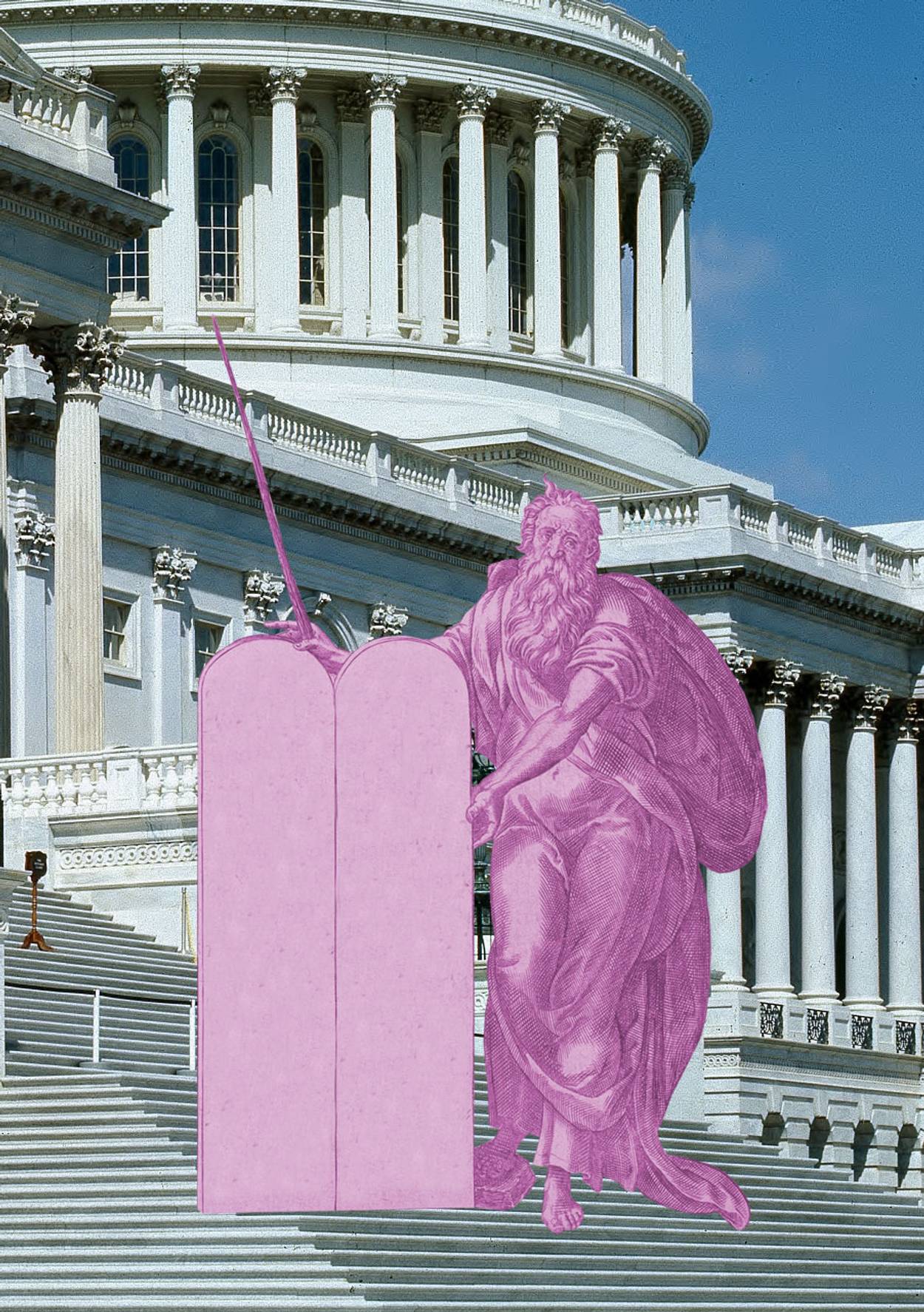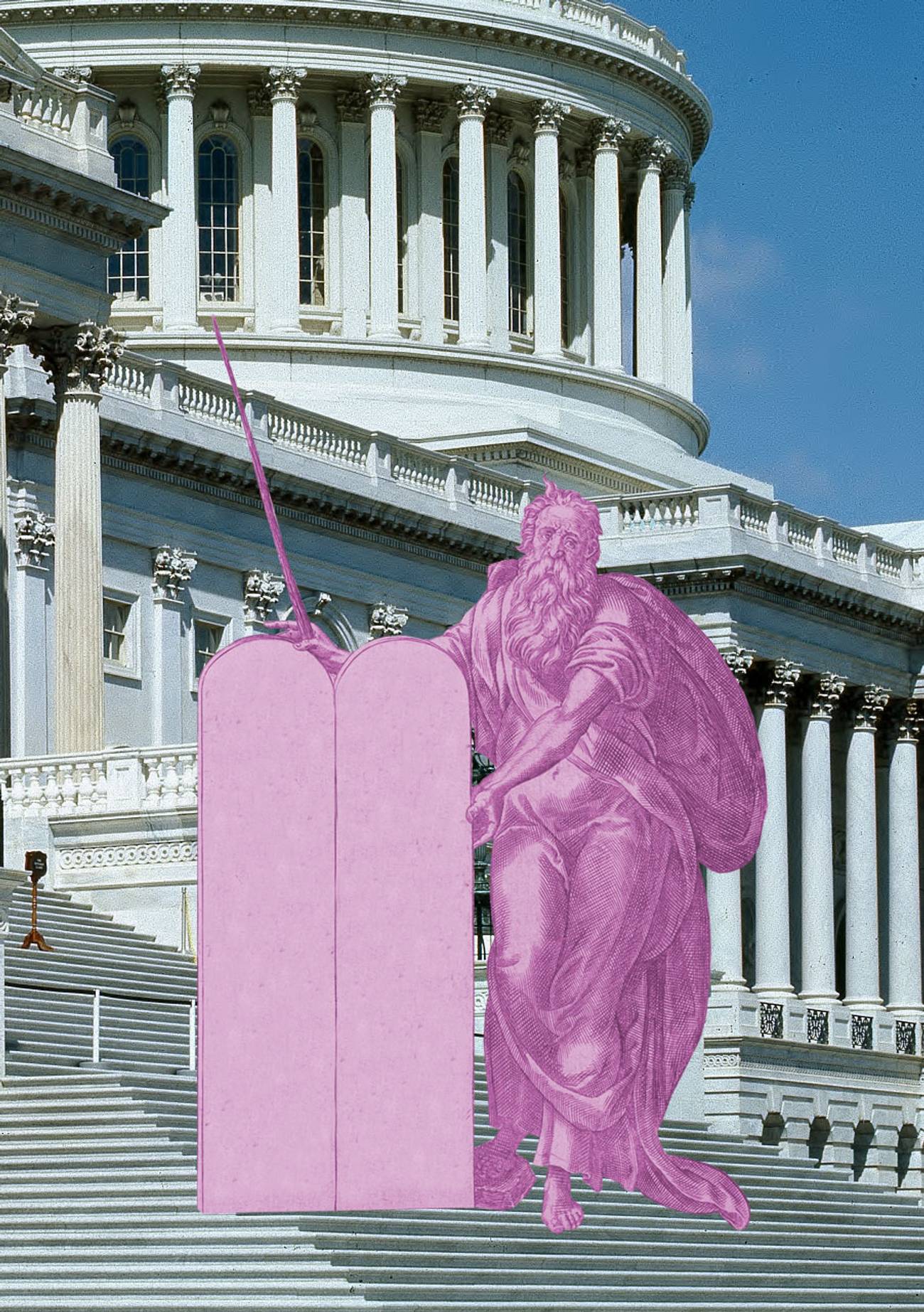Sinai vs. the Capitol Riots
On Jan. 6, our shared sense of truth unraveled. Shavuot shows us how to fix it.




Three days before furious throngs mobbed the U.S. Capitol over suspicions of rigged voting stations, Yale historian and fascism expert Timothy Snyder thought aloud about local news. “If local news were stronger,” he told CNN on Jan. 3, “we’d all have a stronger sense about how the elections actually happened.” Three days after the Capitol riots, on Jan. 9, Snyder elaborated in The New York Times Magazine: “If we lose the institutions that produce facts that are pertinent to us, then we tend to wallow in attractive abstractions and fictions.” The end result of those abstractions and fictions, he wrote, is “losing the distinction between what feels true and what actually is true.”
When local news outlets die in droves, unable to survive in the digital economy, what happens next? According to many scholars—Snyder among them—something else emerges to fill the vacuum in these so-called news deserts. Communities turn to national news outlets like CNN or Fox News, engage their worlds through the broader partisan frameworks, and replace local language with national narratives. And communities turn to social media, replacing shared facts with separate echo-chamber realities. All of which, of course, is just a subset of the ways our communal ties that bind are falling away, leaving us looking far afield for something larger to hold to.
In the vacuum where communal narratives—and actual communities—go, we insert broad abstractions in their place. Sometimes those abstractions are also fictions, far afield from the facts on the ground. And sometimes those abstraction take us so far from the down-to-earth communities where we live, they drive us to storm the gates of the highest offices of the land.
Is there a way we can bring that communal narrative back? The central story of Shavuot—the story of Israel receiving the Torah, the source of all truth, together as a community—offers a way. To work back from Jan. 6, to find our truth in the news deserts, we need to reencounter an earlier desert. We need to go back to Sinai.
Or more precisely, we need to go to one scene before we come to Sinai.
Just before we see God at Sinai, we see Moses’ father-in-law, Yitro (also known as Jethro), pay a visit. Arriving at the desert all the way from Midian, he is welcomed to a festive dinner of state with Moses, Aaron, and the people’s elders—a dinner in which Moses regales him with tales of God’s miracles. Now I know that HaShem is greater than all the gods, an overjoyed Yitro tells his son-in-law.
But the following morning, Yitro finds a scene that bothers him:
Next day, Moses sat as magistrate among the people, while the people stood about Moses from morning until evening.
… when Moses’ father-in-law saw how much he had to do for the people, he said, “… Why do you act alone, while all the people stand about you from morning until evening?”
Moses replied to his father-in-law, “It is because the people come to me to inquire of God. When they have a dispute, it comes before me, and I decide between one person and another, and I make known the laws and teachings of God. …
But Moses’ father-in-law said to him, “The thing you are doing is not good. You will surely wear yourself out, and these people as well. For the task is too heavy for you; you cannot do it alone.” [Exodus 18:13-18, based on translation in Sefaria.org]
And so, on Yitro’s suggestion, Moses institutes a completely new system for administering justice. Moses teaches the people the laws and teachings; Moses, in turn:
chose capable men out of all Israel, and appointed them heads over the people—chiefs of thousands, hundreds, fifties, and tens; and they judged the people at all times: the difficult matters they would bring to Moses, and all the minor matters they would decide themselves. [Exodus 18:25-26]
On the surface, Yitro’s argument—and Moses’ problem—is a matter of simple logistics. How could a single judge, even if that judge is Moses, handle the caseload of an entire nation? Because handling all those complaints is an impossible task, Yitro advises Moses to find other people to help shoulder the burden.
Then again, maybe handling the national caseload is not all that is at play. After all, this is a nation of just-freed slaves. Let loose from their parochial lives, untethered from Egypt—their home for centuries—and wandering the desert, the Israelites are unmoored from the society that has been their whole existence for generations. Here is a people uprooted from home and community—a horrific, enslaving home and community; but a home and community still. And in that break from their old world, they have broken out into endless squabbles, enough fighting to keep the national leadership busy from morning until night. Decades later, Moses puts the mood more bluntly: How could I alone bear … your burden and your bickering? [Deuteronomy 1:12]
In normally functioning communities and societies, our collective infrastructure of truth—our mutual ideals and stories—connect our lives and daily struggles to something bigger than us. Equally important, they bring us back to a shared notion of true and fair when our versions of reality disagree. You say you’re right, and I say I’m right? Our shared principles can guide us back together, whether through formal courts or just basic notions of fairness.
Absent that communal truth for all of us to turn to, even the slightest disagreements become an impenetrable break in the fabric of reality. And when that happens, the only solution is to seek out not each other, but truth itself. And so the people take their pettiest fights before none other than Moses and God. It’s the same reason that today, when we all seem to disagree, we find ourselves posturing our great wisdom and knowledge on Facebook, sharing our information sources as proof of our respective righteousness. Absent a community to help repair the disagreement in how to view reality, people need the greatest sources of truth to declare them absolutely right.
The thing you are doing is not good, Yitro warns. You won’t make it like this. This is Yitro who, as Rashi relates, is an outsider himself; he has a taste of what societal breakdown looks like. He knows it is not good. So he knows he must offer a way to hold society together as it crumbles.
What is that way to hold the people together? A new system of “thousands, hundreds, fifties, and tens,” of people sharing the work of justice, of keeping communal fights both communal and also connected to the highest Law. He brings communal truth to the no man’s land of the desert.
In the next scene, God calls Moses up to Mt. Sinai. And then God suddenly sends Moses down, to stand alongside everyone else the moment God pronounces the Ten Commandments. And then God calls Moses back up, only to almost immediately launch into a litany of civil codes. God tells Moses who must pay whom for a gored ox, for a burnt field, for medical expenses after an injury. All of this makes for an odd show of the Divine Revelation. But as a way to spread communal justice throughout a bickering nation, it’s perfect. It’s perfect, because the Revelation—especially in light of revolution of justice we read about just before—inverts the way we think of what truth ought to be.
We tend to see our hierarchy of knowledge as top-down: Global and national issues are most important; local stuff is trivial. It’s this hierarchy, as much as the challenges of selling news stories in a digital economy, that today has dried up the market for local information and has helped bring about the death of the public square. And, as we fight it out on Facebook—and sometimes in the streets—it’s this top-down hierarchy that makes the bigger issues we argue over feel more urgent to us than the people we’ve known, loved, and lived beside all our lives.
Our communities are splintering, in part, because we are letting different versions of the truth pull us apart. But the revelation at Sinai tells us that just the opposite should be the case. Truth isn’t what brings us up to the mountain to find God, or what brings us standing before Moses for a proclamation. Truth is what brings Moses down with us. Truth is what connects us to each other.
Timothy Snyder, for his part, calls for a return to communal truth, to “a shared commitment to facts as a common good.” That’s the truth of local reporting, and local narratives, and even for the trust in rulings set forth in small-claims courts like those Yitro helped establish. That is a truth that helps us see that even when we have our different sides of the story, we belong to a single story. When you see the truth from the community’s eyes, you can use the truth to talk to your community once again. “[I]f local news were stronger,” Snyder told CNN in the same Jan. 3 interview, “people would have an easier time talking to one another about the issues that actually matter to them, instead of everything becoming a national spectacle.”
To be sure, the message of Sinai is not to ignore the larger framework of things. Yitro’s judges over tens reside in a system that expands up and out to fifties, to hundreds, to thousands, and to Moses and God. Immediately after receiving Torah, and while still at Sinai, the entire people mobilize to build the Mishkan—the holy sanctuary for the whole nation. And of course the Tanakh itself is filled with sagas of kings and decrees and wars. The story of the nation is always the story of the whole nation. But the question is what deeper truth that national story is here to convey: the truth that is above us all, or the truth we live together?
What conception of the truth will we choose for ourselves? Do we want the truth that lets some of us be on the right side of the story, and thus the most correct and righteous? Or do we want the truth that shows the way to live with our neighbors, even when it seems the most challenging? Mt. Sinai calls on us to choose the second way.
If we can adopt the second way of truth, we can begin to find our way back to a shared sense of reality, even among our splintering no man’s land of the digital news desert. We just need to remember that truth isn’t a way for one side to win. Truth is a way for a bickering nation to learn to stand together—shoulder to shoulder, feet on the ground, and hearing the voice of God.
Abe Mezrich is a Jewish poet and software marketer, and author of the collection Between the Mountain and the Land Lies the Lesson.